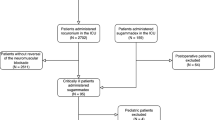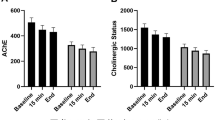Abstract
Succinylcholine, a depolarizing neuromuscular blocking agent used in anesthesia is hydrolyzed in the plasma by the enzyme pseudocholinesterase (PSC). Conditions associated with reduced PSC activity lead to sustained action of succinylcholine and result in prolonged apnea. Cyclophosphamide is an inhibitor of PSC and its suppressive effect may be dose-dependent. We report a case of severe PSC deficiency after high-dose cyclophosphamide at 7 g/m2. The patient received succinylcholine during anesthesia 9 h after chemotherapy and developed prolonged apnea. This case highlights the potential risk of drug-induced PSC deficiency and cautions the use of depolarizing muscular relaxants soon after high-dose cyclophosphamide.
This is a preview of subscription content, access via your institution
Access options
Subscribe to this journal
Receive 12 print issues and online access
$259.00 per year
only $21.58 per issue
Buy this article
- Purchase on Springer Link
- Instant access to full article PDF
Prices may be subject to local taxes which are calculated during checkout
Similar content being viewed by others
Author information
Authors and Affiliations
Rights and permissions
About this article
Cite this article
Koseoglu, V., Chiang, J. & Chan, K. Acquired pseudocholinesterase deficiency after high-dose cyclophosphamide. Bone Marrow Transplant 24, 1367–1368 (1999). https://doi.org/10.1038/sj.bmt.1702097
Received:
Accepted:
Published:
Issue Date:
DOI: https://doi.org/10.1038/sj.bmt.1702097



